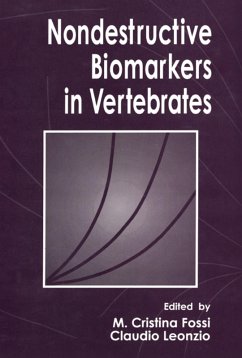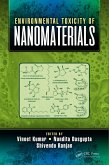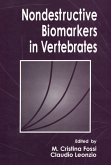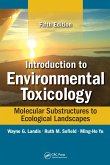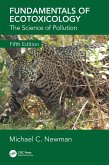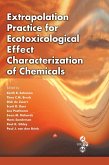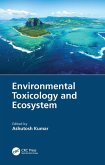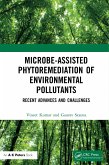177,95 €
177,95 €
inkl. MwSt.
Sofort per Download lieferbar

89 °P sammeln
177,95 €
Als Download kaufen

177,95 €
inkl. MwSt.
Sofort per Download lieferbar

89 °P sammeln
Jetzt verschenken
Alle Infos zum eBook verschenken
177,95 €
inkl. MwSt.
Sofort per Download lieferbar
Alle Infos zum eBook verschenken

89 °P sammeln
- Format: ePub
- Merkliste
- Auf die Merkliste
- Bewerten Bewerten
- Teilen
- Produkt teilen
- Produkterinnerung
- Produkterinnerung

Bitte loggen Sie sich zunächst in Ihr Kundenkonto ein oder registrieren Sie sich bei
bücher.de, um das eBook-Abo tolino select nutzen zu können.
Hier können Sie sich einloggen
Hier können Sie sich einloggen
Sie sind bereits eingeloggt. Klicken Sie auf 2. tolino select Abo, um fortzufahren.

Bitte loggen Sie sich zunächst in Ihr Kundenkonto ein oder registrieren Sie sich bei bücher.de, um das eBook-Abo tolino select nutzen zu können.
Nondestructive Biomarkers in Vertebrates presents an innovative approach for hazard assessment in vertebrates based on nondestructive rather than destructive methods. This volume will be particularly useful to ecotoxicologists, wildlife protection personnel, environmental consultants, and conservationist organizations
- Geräte: eReader
- ohne Kopierschutz
- eBook Hilfe
- Größe: 4.1MB
Andere Kunden interessierten sich auch für
![Environmental Toxicity of Nanomaterials (eBook, ePUB) Environmental Toxicity of Nanomaterials (eBook, ePUB)]() Environmental Toxicity of Nanomaterials (eBook, ePUB)201,95 €
Environmental Toxicity of Nanomaterials (eBook, ePUB)201,95 €![Nondestructive Biomarkers in Vertebrates (eBook, PDF) Nondestructive Biomarkers in Vertebrates (eBook, PDF)]() Cristina FossiNondestructive Biomarkers in Vertebrates (eBook, PDF)177,95 €
Cristina FossiNondestructive Biomarkers in Vertebrates (eBook, PDF)177,95 €![Introduction to Environmental Toxicology (eBook, ePUB) Introduction to Environmental Toxicology (eBook, ePUB)]() Wayne LandisIntroduction to Environmental Toxicology (eBook, ePUB)119,95 €
Wayne LandisIntroduction to Environmental Toxicology (eBook, ePUB)119,95 €![Fundamentals of Ecotoxicology (eBook, ePUB) Fundamentals of Ecotoxicology (eBook, ePUB)]() Michael C. NewmanFundamentals of Ecotoxicology (eBook, ePUB)115,95 €
Michael C. NewmanFundamentals of Ecotoxicology (eBook, ePUB)115,95 €![Extrapolation Practice for Ecotoxicological Effect Characterization of Chemicals (eBook, ePUB) Extrapolation Practice for Ecotoxicological Effect Characterization of Chemicals (eBook, ePUB)]() Extrapolation Practice for Ecotoxicological Effect Characterization of Chemicals (eBook, ePUB)64,95 €
Extrapolation Practice for Ecotoxicological Effect Characterization of Chemicals (eBook, ePUB)64,95 €![Environmental Toxicology and Ecosystem (eBook, ePUB) Environmental Toxicology and Ecosystem (eBook, ePUB)]() Environmental Toxicology and Ecosystem (eBook, ePUB)48,95 €
Environmental Toxicology and Ecosystem (eBook, ePUB)48,95 €![Microbe-Assisted Phytoremediation of Environmental Pollutants (eBook, ePUB) Microbe-Assisted Phytoremediation of Environmental Pollutants (eBook, ePUB)]() Vineet KumarMicrobe-Assisted Phytoremediation of Environmental Pollutants (eBook, ePUB)52,95 €
Vineet KumarMicrobe-Assisted Phytoremediation of Environmental Pollutants (eBook, ePUB)52,95 €-
-
-
Nondestructive Biomarkers in Vertebrates presents an innovative approach for hazard assessment in vertebrates based on nondestructive rather than destructive methods. This volume will be particularly useful to ecotoxicologists, wildlife protection personnel, environmental consultants, and conservationist organizations
Dieser Download kann aus rechtlichen Gründen nur mit Rechnungsadresse in A, B, BG, CY, CZ, D, DK, EW, E, FIN, F, GR, HR, H, IRL, I, LT, L, LR, M, NL, PL, P, R, S, SLO, SK ausgeliefert werden.
Produktdetails
- Produktdetails
- Verlag: Taylor & Francis eBooks
- Seitenzahl: 368
- Erscheinungstermin: 29. Januar 2020
- Englisch
- ISBN-13: 9781000724301
- Artikelnr.: 58719899
- Verlag: Taylor & Francis eBooks
- Seitenzahl: 368
- Erscheinungstermin: 29. Januar 2020
- Englisch
- ISBN-13: 9781000724301
- Artikelnr.: 58719899
- Herstellerkennzeichnung Die Herstellerinformationen sind derzeit nicht verfügbar.
Maria Cristina Fossi is a Staff Member of the Department of Environmental Biology of Siena University. She graduated with a Ph.D. in Environmental Science from Genoa University and has carried on postdoctoral research in the Department of Environmental Biology of Siena University on the fate, bioaccumulation, and biological effects of xenobiotic compounds in the Mediterranean. Since 1981, she has worked on biochemical adaptation to polluted environments by pollution-tolerant species, toxicological effects of xenobiotics on sea-bird populations, the use of biochemical and metabolic biomarkers (MFO, esterases, porphyrins) for the evaluation of environmental pollution and MFO detoxication activity in Antarctic organisms. Her recent research has been concerned with the development of a methodological approach for the assessment of toxicological risk by means of nondestructive biomarkers in endangered vertebrate species. Dr. Fossi is author of more than 90 articles in the scientific literature. She is on the editorial board of the international journal of Ecotoxicology and a member of the European Science Foundation Group for Biological Impact Assessment. She is a member of the American Chemical Society (ACS), the Society of Environmental Toxicology and Chemistry (SETAC), the European Society for Comparative Physiology and Biochemistry (ESCPB), the Italian Society of Ecology (SITE), and the Italian Society of Marine Biology (SIBM). Claudio Leonzio is a Senior Research Assistant in the Department of Environmental Biology of Siena University. Since 1976, he has worked on the distribution of heavy metals and organochlorine compounds in the Mediterranean marine environment and on the dynamic accumulation of mercury in the trophic chain in relation to local geochemical anomalies, in particular. These studies were extended to birds in long-term monitoring studies of populations of marine species, based on residue analysis and biomarkers, especially monooxygenases. He has also been concerned with the relationship between mercury and selenium in processes of antagonism and detoxication. These studies were performed on birds, marine mammals, and experimental animals. He is author of more than 120 articles in the scientific literature.
Dr. Leonzio is a member of the Society of Environmental Toxicology and Chemistry (SETAC), the European Cetacean Society (ECS), the Italian Society of Ecology (SITE), and the Italian Society of Marine Ecology (SIBM).
Dr. Leonzio is a member of the Society of Environmental Toxicology and Chemistry (SETAC), the European Cetacean Society (ECS), the Italian Society of Ecology (SITE), and the Italian Society of Marine Ecology (SIBM).
